Did you know that Spain’s Guardia Civil is one of the oldest law enforcement agencies in the world? Established in 1844, this unique militarized police force has played a vital role in ensuring public safety and order across the country. With a dual structure under both the Ministry of the Interior and the Ministry of Defence, the Guardia Civil combines military discipline with traditional policing.
From patrolling rural roads to safeguarding national security, the Guardia Civil’s responsibilities are vast. Known for their iconic uniforms and motto, “Honor is my badge,” this force has become a symbol of trust and reliability. Over the years, it has evolved into a model for other law enforcement agencies worldwide.
Today, the Guardia Civil continues to uphold its mission, ensuring the safety of citizens and maintaining order across Spain. Its legacy of service and dedication remains a cornerstone of the nation’s security framework.
Key Takeaways
- The Guardia Civil was founded in 1844 and is one of the oldest law enforcement agencies.
- It operates under both the Ministry of the Interior and the Ministry of Defence.
- Known for its military discipline and traditional policing methods.
- Plays a crucial role in maintaining public safety and national security.
- Its motto, “Honor is my badge,” reflects its commitment to service.
Introduction to the Guardia Civil in the Philippines
The Guardia Civil’s influence extends beyond Spain, shaping law enforcement in the Philippines. Established in the 19th century, this force played a pivotal role in maintaining order and ensuring public safety. Its disciplined structure and tailored methods have left a lasting impact on the country’s security framework.
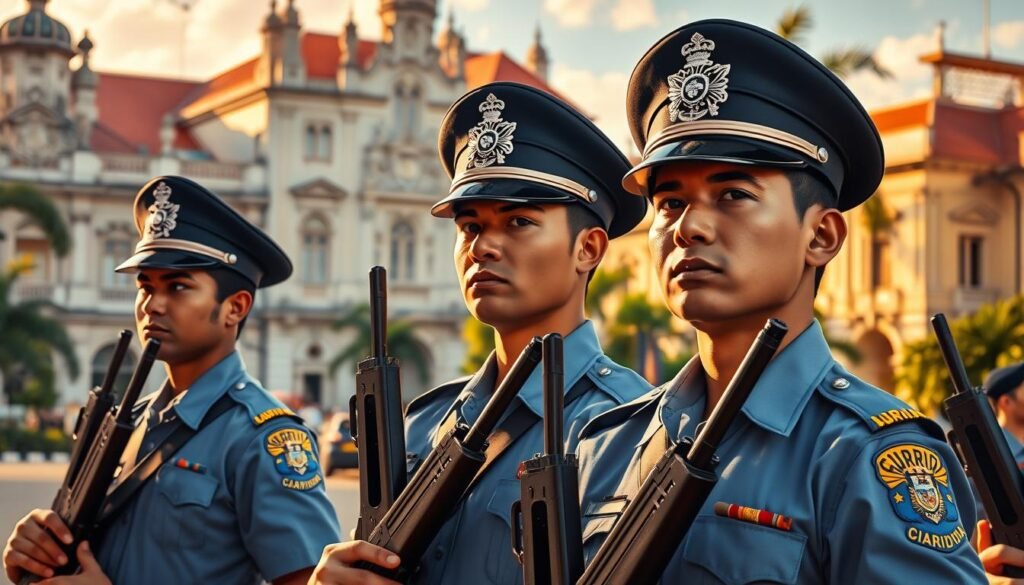
Overview of Duties and Responsibilities
The Guardia Civil in the Philippines was tasked with a wide range of responsibilities. From community policing to traffic supervision, its members worked tirelessly to uphold the law. Their duties also included safeguarding public buildings and ensuring the safety of citizens.
This force was known for its ability to adapt to diverse environments. Whether patrolling rural roads or managing urban areas, the Guardia Civil maintained a strong presence. Their commitment to duty and responsibility made them a trusted institution.
The Importance of Public Safety and Community Trust
Public safety was a top priority for the Guardia Civil. Their efforts to build community trust were crucial in maintaining order. By collaborating with local authorities, they ensured that safety measures were robust and effective.
The methods used by the Guardia Civil were inspired by Spain’s experience but tailored to meet Philippine needs. This approach helped them address local challenges while maintaining their core values. Their dedication to service and protection remains a model for modern law enforcement.
| Year | Force Size | Key Responsibilities |
|---|---|---|
| 1868 | 1,200 men | Initial deployment, community policing |
| 1880 | 3,600 men | Expansion to Luzon and Visayas |
| 1897 | 155 officers | Public safety during the Philippine Revolution |
Strong collaboration between public authorities and community members ensured continued trust and safety. The Guardia Civil’s legacy in the Philippines highlights the importance of disciplined law enforcement and community engagement.
History and Evolution of the Guardia Civil
The origins of Spain’s national gendarmerie trace back to the mid-19th century. Established in 1844 under Queen Isabel II, this force was created to combat highway brigandage and restore order in rural areas. Its founding marked a significant shift from fragmented local efforts to a centralized, efficient law enforcement unit.
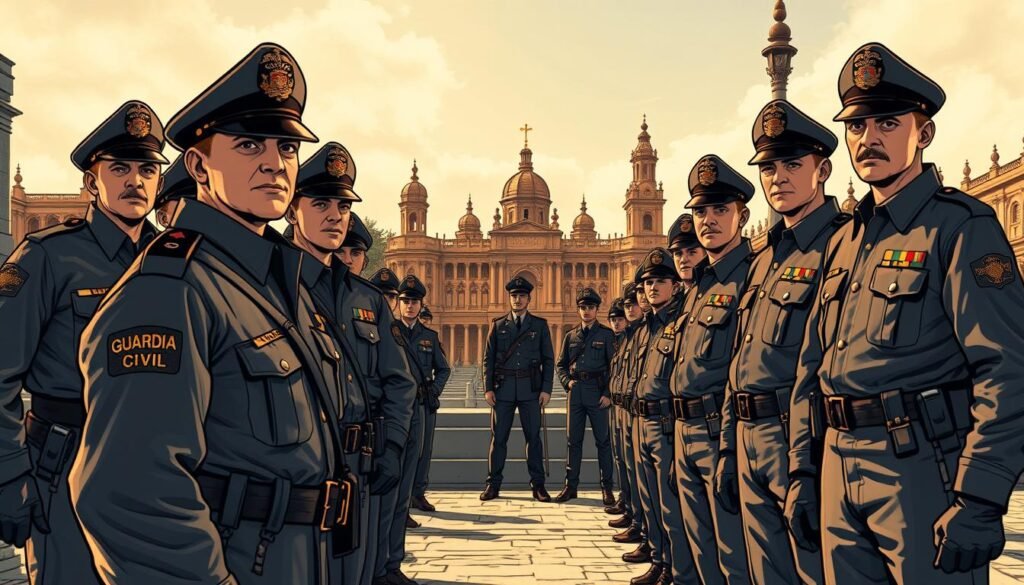
Founding and Early Operations
The Duke of Ahumada played a pivotal role in shaping the early operations of this force. The first academy in Valdemoro became the training ground for officers, instilling discipline and expertise. Their primary mission was to patrol roads and ensure the safety of travelers, which quickly earned them public trust.
By the late 19th century, the force had expanded its responsibilities. It began safeguarding public buildings and managing traffic, showcasing its adaptability. This period laid the foundation for its reputation as a reliable and versatile unit.
Transformation Through the Centuries
Over the years, the force underwent significant changes. The Spanish Civil War tested its loyalty, with many members remaining committed to their duty. During the Francoist era, it adapted to new political realities, further solidifying its role in national security.
Modernization efforts in the 20th century introduced advanced tactics and updated uniforms. The iconic tricorne hat, once a symbol of authority, evolved to reflect contemporary needs. These transformations ensured the force remained effective in addressing emerging challenges.
Today, the legacy of its early operations continues to influence modern practices. From patrolling highways to managing public safety, this force remains a cornerstone of Spain’s security framework. Its historical evolution underscores its enduring commitment to service and protection.
Guardia Civil: Upholding Law Enforcement and Community Protection
At the heart of Spain’s law enforcement lies a force built on honor and discipline. This agency, known for its unwavering commitment to public safety, operates under a set of core values that guide its every action. Its motto, “Honor is my badge,” reflects its dedication to integrity, duty, and protection.
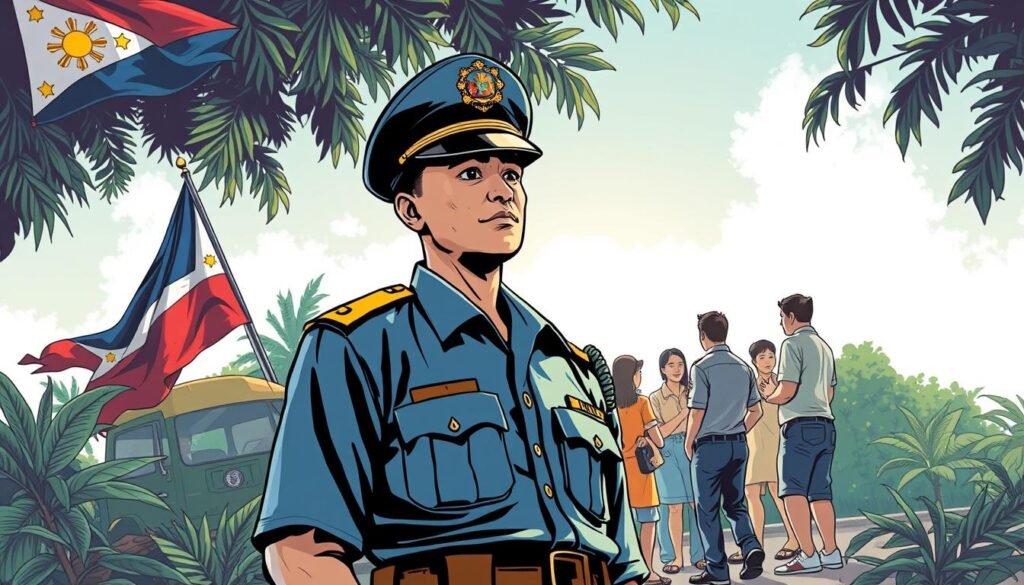
Core Values and Motto in Action
The Guardia Civil is driven by a strong ethical framework. Its members are trained to prioritize service above all else, ensuring the safety of citizens in both urban and rural areas. The motto “Honor is my badge” is not just a phrase but a way of life for every officer.
This force employs a systematic approach to law enforcement. Rigorous training and organizational discipline ensure that every mission is executed with precision. Whether patrolling highways or safeguarding public spaces, the unit remains steadfast in its commitment to excellence.
Community protection is integral to its mission. By building trust with local residents, the agency fosters a sense of security and cooperation. This approach has proven effective in maintaining order and preventing crime across the country.
| Core Value | Impact |
|---|---|
| Honor | Builds trust and integrity |
| Duty | Ensures consistent service |
| Protection | Enhances public safety |
Historically, the Guardia Civil has adapted to changing times while staying true to its values. From its early days of patrolling rural roads to modern-day security operations, the force has evolved to meet new challenges. Its robust structure and clear chain of command support its effectiveness in maintaining public order.
Uniform standards and trust-building are essential for successful community engagement. By adhering to these principles, the agency continues to serve as a protector and guardian of public safety. Its legacy of service and dedication remains a cornerstone of Spain’s security framework.
Modern Capabilities and Specialized Services
Modern law enforcement demands advanced capabilities to address evolving challenges. The Guardia Civil has embraced this need by integrating cutting-edge technology and specialized services into its operations. From high-tech patrols to life-saving rescues, this force ensures public safety across diverse environments.
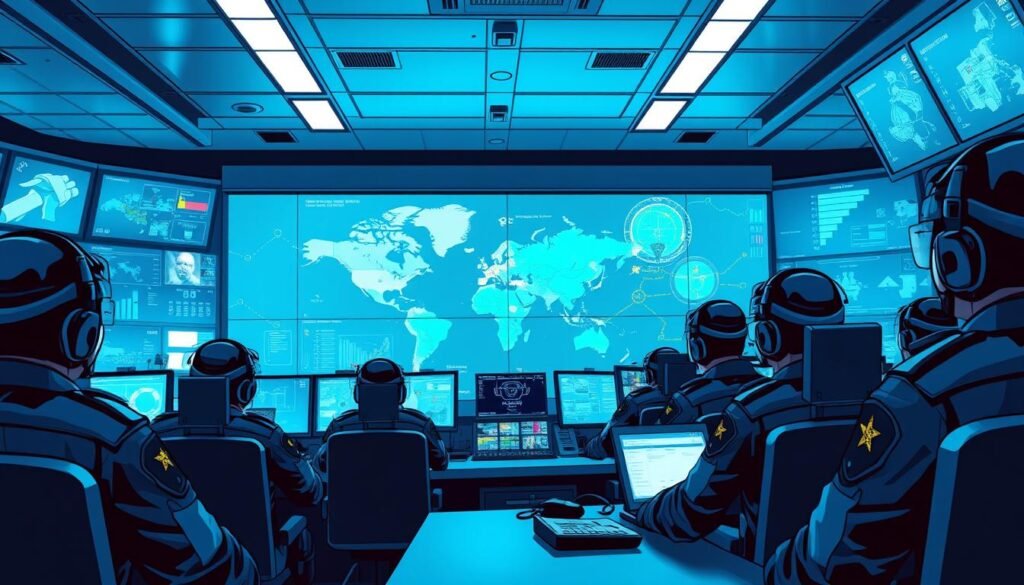
Advanced Patrol and Traffic Enforcement
Patrolling roads and managing traffic are critical tasks for maintaining order. The Guardia Civil uses state-of-the-art equipment, such as drones and GPS tracking, to enhance efficiency. Coordinated response strategies ensure quick reactions to emergencies, reducing risks on the road.
Officers are trained to handle complex situations, from accidents to organized crime. Their presence on highways and rural routes ensures that citizens feel safe and protected. This proactive approach has significantly improved traffic safety across Spain.
Mountain Rescue, Maritime, and Air Services
Specialized units are essential for challenging terrains and emergencies. The mountain rescue team is equipped with advanced gear and undergoes rigorous training. They operate in remote areas, saving lives during natural disasters or accidents.
Maritime and air services extend the force’s reach, enhancing national security. From coastal patrols to aerial surveillance, these units provide rapid response capabilities. Their integration with other agencies ensures a cohesive approach to public protection.
| Service | Key Features |
|---|---|
| Advanced Patrol | Drones, GPS tracking, coordinated responses |
| Mountain Rescue | Specialized gear, rigorous training, remote operations |
| Maritime & Air | Coastal patrols, aerial surveillance, rapid response |
These modernized services demonstrate the Guardia Civil’s commitment to innovation and efficiency. By leveraging technology and specialized expertise, this force continues to uphold its mission of safeguarding communities and maintaining order. For more insights into their advanced operations, visit this resource.
International Missions, Cooperation, and Cyber Initiatives
From peacekeeping missions to cyber investigations, this force is redefining international security. With a focus on global collaboration, it plays a pivotal role in maintaining order and addressing modern threats. Its efforts span crisis management, intelligence sharing, and digital policing, making it a key player in global security frameworks.
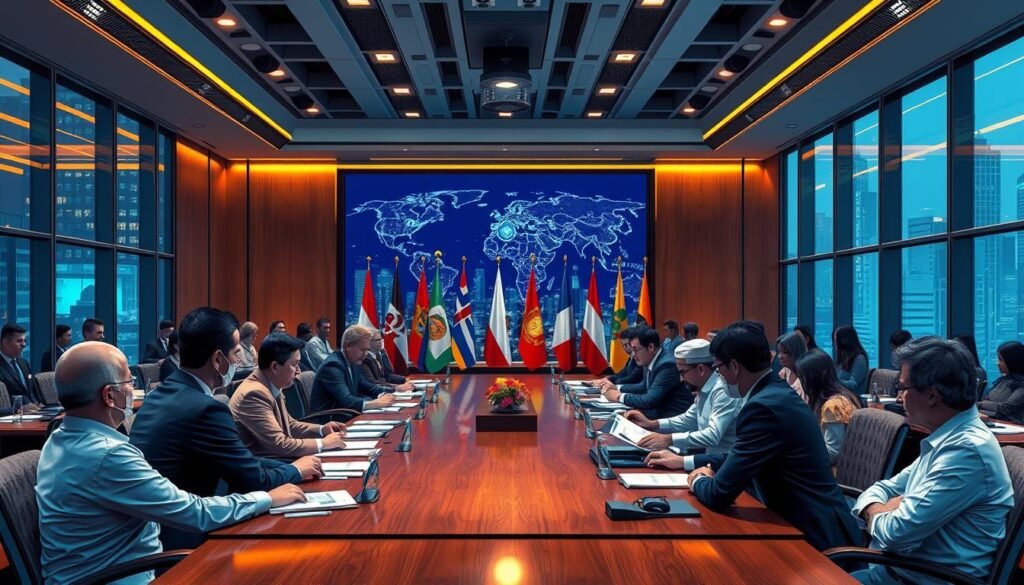
Crisis Management and Peacekeeping Operations
The agency’s involvement in peacekeeping missions has been instrumental in stabilizing conflict zones. Specialized units are deployed to areas in need, ensuring safety and restoring order. These operations often involve collaboration with international organizations like the UN and NATO.
For example, during recent missions in the Sahel region, the force contributed to enhancing stability and security. Its expertise in crisis management has set a benchmark for other agencies worldwide.
Cross-border Collaboration and Intelligence Gathering
Cross-border cooperation is essential in combating organized crime and terrorism. The agency works closely with EUROPOL and other international bodies to share intelligence and coordinate efforts. This collaboration ensures a unified approach to addressing global threats.
By leveraging advanced tools and strategies, the unit has successfully disrupted numerous criminal networks. Its ability to adapt to diverse environments makes it a trusted partner in international security initiatives.
Enhancing Cybersecurity and Digital Investigations
As cyber threats grow, the agency has expanded its focus on digital investigations. It employs cutting-edge technology to combat cybercrime, protecting critical infrastructure and individual rights. This shift highlights its adaptability to modern security challenges.
Spain’s participation in initiatives like NATO’s Cooperative Cyber Defence Centre of Excellence underscores its commitment to cybersecurity. For more insights into global cybersecurity efforts, visit this resource.
Through its international missions and innovative approaches, this force continues to strengthen global security. Its dedication to service and protection remains a cornerstone of its mission, ensuring safety across borders and digital landscapes.
Community Engagement and Digital Transformation
In today’s digital age, law enforcement is embracing technology to connect with communities like never before. The Guardia Civil is at the forefront of this transformation, leveraging innovative tools to enhance transparency and public trust. From virtual reality displays to interactive platforms, these advancements are reshaping how citizens interact with their protectors.
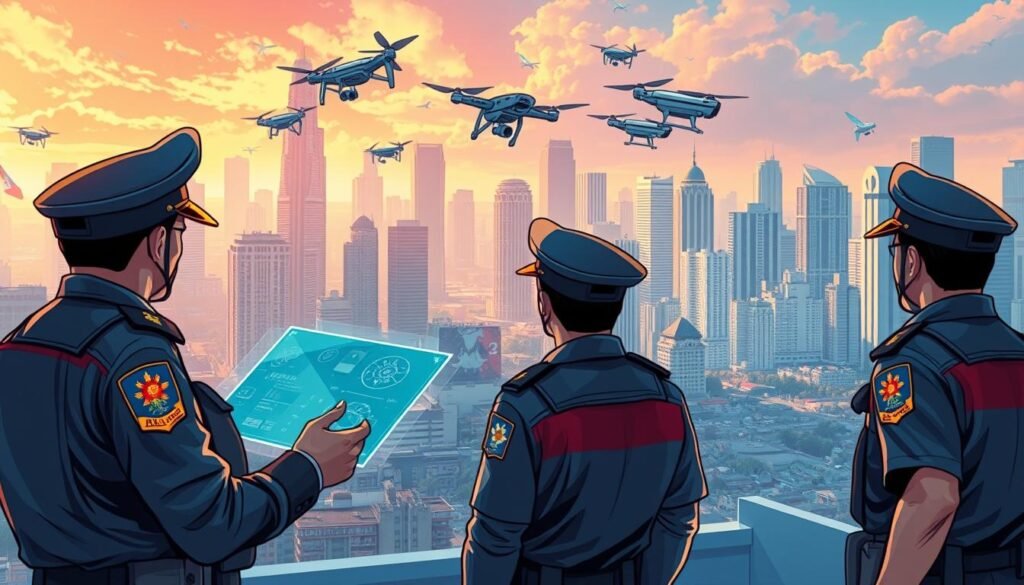
Innovations Driving Transparency and Interaction
One standout example is the use of virtual reality to showcase real-life operations. Visitors can experience firsthand what it’s like to conduct a mountain rescue or patrol a highway. This immersive approach not only educates the public but also builds a deeper understanding of the challenges faced by law enforcement.
Digital platforms play a crucial role in fostering trust. Social media channels and dedicated apps allow citizens to report incidents, access information, and engage directly with officers. These tools create a two-way dialogue, ensuring that community voices are heard and valued.
For instance, the integration of Urban Digital Twins (UDTs) has proven effective in improving urban planning and safety. By reflecting real-world systems, UDTs enable better decision-making and resource allocation. Learn more about this innovative approach here.
Another key initiative is the use of data analytics to predict and prevent crime. By analyzing patterns, law enforcement can allocate resources more efficiently and respond to threats proactively. This data-driven approach enhances both safety and operational efficiency.
These digital strategies are not just about technology—they’re about building stronger communities. By embracing innovation, the Guardia Civil is setting a new standard for modern policing. For more insights into community engagement, visit this resource.
As technology continues to evolve, so does the relationship between law enforcement and the public. These advancements are not just tools—they’re bridges that connect, inform, and protect. The future of policing lies in this seamless blend of tradition and innovation.
Conclusion
The Guardia Civil stands as a testament to unwavering dedication in law enforcement. From its historical roots to its modern-day operations, this force has consistently prioritized public safety and order. Its core values of honor, duty, and protection have guided its mission across generations.
Today, the unit continues to evolve, integrating advanced technology and specialized services. Whether patrolling highways, conducting mountain rescues, or enhancing cybersecurity, its adaptability ensures effective responses to diverse challenges. Community engagement remains a cornerstone, fostering trust and collaboration.
Looking ahead, the Guardia Civil is poised to lead in the future of policing. Its commitment to innovation and service ensures it remains a reliable guardian of security. For more insights into its impactful role, explore this resource.
As society evolves, so does this force, reaffirming its vital role in safeguarding communities. The legacy of the Guardia Civil is one of resilience, adaptability, and unwavering service.
FAQ
What is the primary role of the Guardia Civil?
The Guardia Civil is a law enforcement unit in Spain responsible for maintaining public safety, enforcing laws, and protecting communities. Their duties include patrol, traffic control, and specialized services like mountain rescue.
How does the Guardia Civil contribute to public safety?
They ensure safety through regular patrols, traffic enforcement, and emergency response. Their presence helps deter crime and fosters trust within communities.
What are some specialized services offered by the Guardia Civil?
They provide advanced services such as mountain rescue, maritime operations, and air support. These units are trained to handle emergencies in challenging environments.
How has the Guardia Civil evolved over time?
Founded in the 19th century, the Guardia Civil has transformed to meet modern challenges. They’ve expanded their capabilities to include cyber initiatives and international cooperation.
What role does the Guardia Civil play in international missions?
They participate in peacekeeping operations, crisis management, and cross-border collaboration. Their expertise in intelligence gathering enhances global security efforts.
How does the Guardia Civil engage with the community?
Through digital transformation and innovative programs, they promote transparency and interaction. This helps build stronger relationships with the public.
What values guide the Guardia Civil’s operations?
Their core values include integrity, service, and commitment to protecting citizens. These principles drive their mission to uphold law and order.
How does the Guardia Civil handle cybersecurity?
They focus on enhancing digital investigations and combating cybercrime. Their initiatives aim to safeguard national and international digital infrastructure.
Source Links
- Policia Nacional and Guardia Civil difference
- Guardia Civil in the Philippines 1868-1898: Native Soldiers in service of the Colonial State
- Security Policy
- Civil Guard (Philippines)
- Civil Guard (Philippines)
- Civil Guard (Spain)
- Guardia Civil – NATO Stability Policing Centre of Excellence
- Law enforcement in Spain
- Guardia Civil is a well-respected law enforcement agency
- The Militarization of Law Enforcement: Evidence from Latin America | Perspectives on Politics | Cambridge Core
- "Today democracy has prevailed because the Constitution has been upheld", says Mariano Rajoy
- El Grupo de Acción Rápida (GAR): The Guardia Civil Rapid Action Group
- Spain
- Democratic Governance Challenges of Cyber Security
- Cyber Security in Spain: A Proposal for its Management (ARI) – Elcano Royal Institute
- Preventing violent extremism to counter home-grown jihadism: Learning by doing
- Spain – United States Department of State
- Spanish Armed Forces conclude mission in Central African Republic
- ECCHR: ND and NT v. Spain
- Spanish Policy Against Terrorism: The Guardia Civil and ETA | GEES

